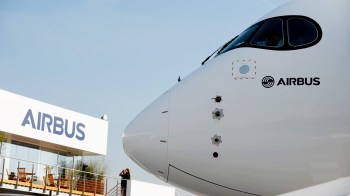Airbus takes another hit, but it’s still competing
KAI RYSSDAL: Airbus got another kick in the pants today. British Airways announced it’s buying four new jets from archrival Boeing with the option to buy four more. It’s probably small solace, but B.A. added it was a close decision whether to buy from Airbus or its main competitor.
The news comes during a tough week for the European airplane maker. On Monday, Airbus postponed a major reorganization plan it’s hoping will cut costs. Costs that are being driven by delays in the A380 super jumbo — $6.5 billion in lost earnings so far.
But times haven’t always been so bleak for Airbus. John Newhouse is the author of a new book about the Boeing-Airbus rivalry. Mr. Newhouse, welcome to the program.
JOHN NEWHOUSE: Thank you.
RYSSDAL: I don’t want to put too simple a point on what is an amazingly complex question that we’ll get to later. But, what the heck happened to competition in the aviation industry?
NEWHOUSE: Well I think there has been competition all along the line. I think competition dwindled a lot about 25, 30 years ago because Boeing’s main competitors — McDonnell Douglas and Lockheed — were exiting from the business. Starting with Lockheed, they had made a number of mistakes. And McDonnell Douglas was not only making mistakes, it gradually reached the stage where it couldn’t really afford to. Because not only was Boeing well ahead of it, but this tiny wannabe from Europe, Airbus, was beginning to eat its lunch.
RYSSDAL: Where did Airbus come from? Did somebody sitting in France and Germany just get some idea one day that they’re gonna build an airplane and go from there?
NEWHOUSE: I don’t think they decided to build an airplane. I think that the French and the Germans and the British — and a lesser extent, the Spanish — decided to pull their resources, because no one of their companies individually was strong enough to compete with the much larger American companies. So they created something called Airbus Industrie
. For a period of roughly 13 years, starting in 1985, they were brilliantly led by a guy named Jean Pierson
, who retired in 1998. So Airbus came roaring ahead. Boeing really never thought that could happen, but it did.
RYSSDAL: Deserved, or not?
NEWHOUSE: Deserved, in my opinion. But it’s really better to be lucky than smart, because Boeing was able to survive its mistakes. And in the end, come produce an airplane that’s been a runaway bestseller: the 787. It made that decision belatedly and rather reluctantly. Then of course, the decision has been fully vindicated. Whereas Airbus’s mistakes, few mistakes, have really hurt the company enormously.
RYSSDAL: What role do airlines have in the success or failure of a major aerospace manufacturer?
NEWHOUSE:
Huge. I mean a single airline or two can make or break an aircraft program, and that has happened. Airbus has gotten into very deep trouble. In 18 months, it slid into much deeper difficultly than Boeing had during its decline, because it had to postpone deliveries of an airplane they wanted. This so-called super jumbo. But those same airlines have responded by ordering more of that airplane. Because it is in the larger interests, or maybe the highest interest, of these airlines, the ones that are intelligent and
well-lit, to keep two suppliers in the game. No airline wants to be at the mercy of a single supplier.
RYSSDAL: So while it might seem now that we’re at a great divide in the aviation industry, with Boeing going with a 787, the Dreamliner, and Airbus going with a huge A380 that has caused it all these problems, you’re saying that in three or four years, you and I can have the same conversation and it would go a different way?
NEWHOUSE: I think so. I mean, Airbus was still making good airplanes, more economically than Boeing. But after Jean Pierson left in ’98, he was replaced by a guy named Noel Forgeard
. And Forgeard coasted for awhile because he had Pierson’s order base. But then, he started making decisions on his own, and these decisions have been extremely damaging to Airbus. But they’ve gotten rid of Pierson and they’ve managed to, I think, rationalize to some degree this crazy
jerry-built corporate structure they have. A structure in which the French and the Germans have equal voices. So you don’t have the sort of unitary leadership that Boeing has. It’s a sort of cross-border skirmishing, French and German. So they’re beginning to calm that down a bit. It hasn’t gone away, but it’s less divisive than it was. And I think Airbus is gradually going to get its act together.
RYSSDAL: John Newhouse’s latest book is called “Boeing Versus Airbus.” Mr. Newhouse, thanks a lot for your time.
NEWHOUSE: Thank you.
There’s a lot happening in the world. Through it all, Marketplace is here for you.
You rely on Marketplace to break down the world’s events and tell you how it affects you in a fact-based, approachable way. We rely on your financial support to keep making that possible.
Your donation today powers the independent journalism that you rely on. For just $5/month, you can help sustain Marketplace so we can keep reporting on the things that matter to you.


















